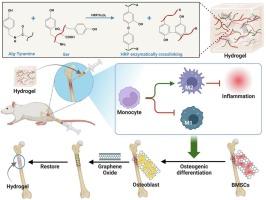海藻酸-丝素复合水凝胶促进大鼠股骨远端骨缺损修复
IF 4.7
2区 医学
Q2 IMMUNOLOGY
引用次数: 0
摘要
骨缺损,特别是生物材料植入后并发的炎症和免疫反应,仍然是骨再生的主要挑战。在这项研究中,我们开发了海藻酸盐-丝素-氧化石墨烯复合材料(Alg/SF/GO)水凝胶,采用HRP/ h2o2介导的酶交联,锚定在Alg-酪胺框架上。这些水凝胶具有优异的耐久性和力学性能,并且在丝素蛋白和氧化石墨烯释放时具有可控的降解行为。Alg/SF/GO水凝胶显著增强成骨分化和矿化,同时通过NF-κB和MAPK途径促进M2巨噬细胞极化和迁移。这些水凝胶诱导M2巨噬细胞极化,通过细胞因子分泌促进骨髓间充质干细胞(BMSCs)的成骨分化。体外和体内实验均表明,Alg/SF/GO水凝胶促进巨噬细胞向周围组织浸润,减轻炎症和纤维囊增厚。最终,将Alg/SF/GO水凝胶注入骨髓间充质干细胞,成功修复了大鼠股骨远端缺损。这种骨愈合生物材料显示出巨大的潜力,特别是在治疗不规则骨缺损方面。本文章由计算机程序翻译,如有差异,请以英文原文为准。

Promotion of rat femoral distal bone defect repair using alginate-silk fibroin composite hydrogel
Bone defects, especially those complicated by the inflammatory and immune responses following biomaterial implantation, remain a major challenge in bone regeneration. In this study, we developed Alginate-Silk Fibroin-Graphene Oxide Composite (Alg/SF/GO) hydrogels anchored on the Alg-Tyramine framework, employing HRP/H2O2-mediated enzyme crosslinking. These hydrogels demonstrated excellent durability and mechanical properties, along with controllable degradation behavior upon the release of silk fibroin and GO. The Alg/SF/GO hydrogels substantially enhanced osteogenic differentiation and mineralization, while also promoting M2 macrophage polarization and migration via the NF-κB and MAPK pathways. The M2 macrophage polarization induced by these hydrogels facilitated the osteogenic differentiation of bone marrow mesenchymal stem cells (BMSCs) through cytokine secretion. Both in vitro and in vivo experiments showed that Alg/SF/GO hydrogels promoted macrophage infiltration into surrounding tissues, reducing inflammation and fibrous capsule thickening. Ultimately, injecting BMSCs with Alg/SF/GO hydrogels successfully repaired distal femoral defects in rats. This bone-healing biomaterial shows promising potential, particularly for treating irregular bone defects.
求助全文
通过发布文献求助,成功后即可免费获取论文全文。
去求助
来源期刊
CiteScore
8.40
自引率
3.60%
发文量
935
审稿时长
53 days
期刊介绍:
International Immunopharmacology is the primary vehicle for the publication of original research papers pertinent to the overlapping areas of immunology, pharmacology, cytokine biology, immunotherapy, immunopathology and immunotoxicology. Review articles that encompass these subjects are also welcome.
The subject material appropriate for submission includes:
• Clinical studies employing immunotherapy of any type including the use of: bacterial and chemical agents; thymic hormones, interferon, lymphokines, etc., in transplantation and diseases such as cancer, immunodeficiency, chronic infection and allergic, inflammatory or autoimmune disorders.
• Studies on the mechanisms of action of these agents for specific parameters of immune competence as well as the overall clinical state.
• Pre-clinical animal studies and in vitro studies on mechanisms of action with immunopotentiators, immunomodulators, immunoadjuvants and other pharmacological agents active on cells participating in immune or allergic responses.
• Pharmacological compounds, microbial products and toxicological agents that affect the lymphoid system, and their mechanisms of action.
• Agents that activate genes or modify transcription and translation within the immune response.
• Substances activated, generated, or released through immunologic or related pathways that are pharmacologically active.
• Production, function and regulation of cytokines and their receptors.
• Classical pharmacological studies on the effects of chemokines and bioactive factors released during immunological reactions.

 求助内容:
求助内容: 应助结果提醒方式:
应助结果提醒方式:


